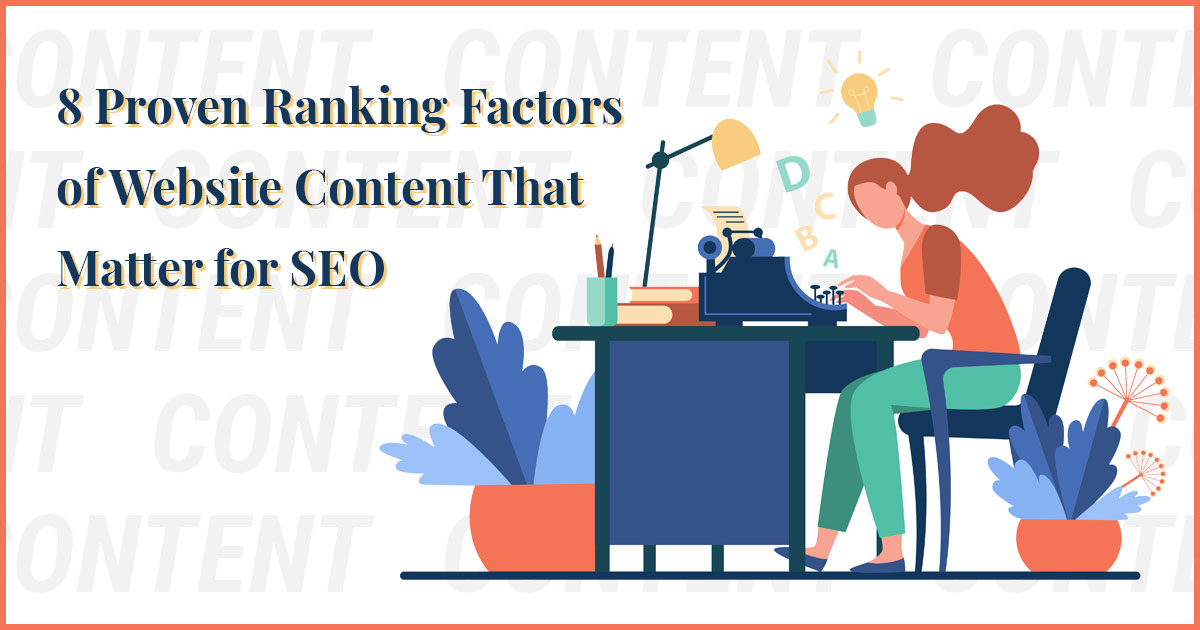Ranking factors!
SEO is a broad term whose requirements keep on changing over time. Therefore, it can be challenging to catch up with its pace.
You want to catapult your site from zero to the first page, right?
Look no further! This ultimate guide has got you covered.
Remember, you will get more and more traffic only if you have optimized your site properly. Well-optimized sites generate more conversions and leads.
In simple words, you can say that no one will be able to reach your site if you have not done its SEO.
So, it’s crucial to know the ranking factors of SEO. This complete guide has unleashed eight boosting factors of website content.
Let’s get started!
Top eight ranking factors for Google
Following are the top most ranking factors of Google you should practice:
-
Publish excellent content
As a site owner, you want to create top-quality content for your website. In order to appear in the Google searches, posing tailor-made content matters a lot.
In this era of marketing, quality content reigns. So, you have to provide readers with authentic and valuable information. Otherwise, it will haunt you.
What is high-quality content?
The content crafted to tailor readers’ needs, encourage them to read the entire page, and lower bounce rate is called high-quality content.
-
Proper use of keywords
You should carefully do keyword research because it sets the base for developing impeccable content. In fact, it provides a crystal-clear roadmap to achieving your writing goals.
It would be best to analyze your competitors’ sites for unveiling high-quality keywords.
Relevancy is another key element of ranking. Your content should directly respond to users’ queries.
-
Write evergreen content
Your content should be updated. Not only should it include valuable information only, but pictures, infographics, charts, and other statistics.
-
Craft compelling meta titles and descriptions
In order to craft engaging titles and descriptions, you should make them innovative first. Neither too long nor too short!
Plus, you should also incorporate the main keyword in titles and descriptions. Avoid stuffing keywords. Instead, come up with a natural style.
Meta titles and descriptions should not exceed 60 and 160 characters, respectively. If your characters exceed, Google will not show them to readers. Therefore, they both should be comprehensive and concise.
What is the best approach to write optimum meta titles and descriptions?
Using a free word counter helps you to stick to the particular characters and words. Moreover, it gives you a helping hand to provide value to your readers and drive clicks.
That’s why expert content writers use a reliable word counter to generate clickable titles. It also helps you keep track of the article’s length.
In a nutshell, it allows you to write engaging titles and descriptions within the required length to pique readers’ interest and encourage them to click the title.
2. Crawling factor
Remember, Google will not rank your site to the first page if it cannot find it. Accordingly, your site’s crawlability is a crucial ranking factor.
It helps search engines to scan your site and go through its content. So, you should allow Google to crawl your site precisely.
3. Page speed
Another top-notch ranking factor is your web page’s speed. Search engines want to make better users’ experiences. A fast-loading page speed does the perfect magic.
If you underestimate user experience (UX), rest assured you are missing a lot. Most importantly, people will bounce your site if it has an unattractive layout.
There are more than 1.8 billion websites today; accordingly, you have to develop an amazing layout for your site.
Google can cause a penalty to your site if it does not load fast on mobile phones. Thus, allow Google to improve your site’s user experience.
4. Spice up your content with SEO
In the above-mentioned section, you have read about quality content.
You can provide more oxygen to your written content using quality SEO techniques.
With SEO-optimized content!
Remember, Google’s algorithm undertakes keywords. Keywords are the words and phrases people use to fix their pain points.
SEO does not only revolve around primary keywords. Instead, ranking depends on your LSI (Latent Semantic Indexing) as well.
This is because they provide a roadmap to Google to scan the results.
5. Links
Links are important ranking factors that cannot be ignored. There are three kinds of links:
- Internal links
- Inbound links
- Outbound links
Hence, when you add a link to your text, it should describe what the next content is about.
6. Social media presence
What if people on social media platforms share your written content?
Obviously, you will be happy!
In fact, it is a sign that your content has worth it. More social media shares will bring more traffic to your site. Most significantly, it will also help you in building backlinks.
You should have a worth-considering social media presence.
7. Domain age
Although you cannot manipulate the age factor of your site, it is worth considering!
Statistics have shown that websites with older domains rank better. On the contrary, newly established websites take time to rank on the first page.
8. Local SEO
Surprisingly, Google ranks credible and authoritative sites. The more trustworthy your site is, the better your site’s visibility will be.
Therefore, business listings or local SEO play a crucial part in ranking. You should:
- Develop a Google Business page
- Create a powerful profile
- Use your business name, phone, and address in your profile
Final thoughts
Now, you are familiar with the ranking factors; hence, it’s the best time to rank your site.
Whether you are crafting new content or updating the existing one, this guide will help you to improve your ranking position.
Once the traffic comes to your site, your next step is to convert them into your customers.
So what are you waiting for?
Consider these factors and let your site perform better.


